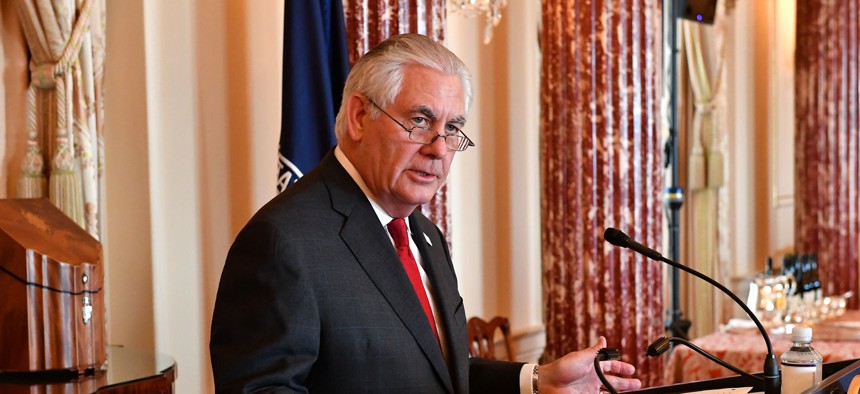
State Department
Rex Tillerson’s Slow-Motion Exit
The latest report about the secretary of state’s possible ouster undermines his credibility as America’s top diplomat.
The president of the United States and the man he made secretary of state have been at odds almost since the beginning. Donald Trump and Rex Tillerson clashed over the Iran nuclear deal, NATO, the Qatar crisis, and North Korea. Then there were reports that Tillerson called Trump a "moron," prompting the president to challenge him to an IQ test. Taken individually, each disagreement could be dismissed. Taken together, they made Tillerson’s position untenable.
The New York Times reported Thursday, citing senior administration officials, that the White House had developed a plan to force out Tillerson by the end of the year and replace him with Mike Pompeo, the CIA director. If the report, which said Trump hadn’t yet signed off on the plan, is accurate, Tillerson would join the list of the secretaries of state with the shortest tenure (Elihu B. Washburne, President Ulysses Grant’s top diplomat, resigned after 11 days; he was then named ambassador to France). Even if it’s not accurate, it further undermines Tillerson’s position as secretary of state, and further saps his credibility: What could be worse for America’s top diplomat than a leaked plan to replace him at some indefinite point in the future?
Reports about Tillerson's departure, which have circulated for months, emerged most recently last month when NBC News reported that he had called Trump a "moron" during a meeting that did not involve the president, following his controversial remarks to the Boy Scouts of America. Tensions between the two men were reportedly high during this period and Tillerson had seriously considered quitting, NBC reported, but was persuaded to stay by James Mattis, the defense secretary, and John Kelly, the White House chief of staff. Vice President Mike Pence reportedly talked to Tillerson about not airing his policy disagreements publicly, NBC added. The Times report Thursday said Kelly had formulated the plan to replace Tillerson with Pompeo.
Reports of Tillerson’s impending exit also circulated in August when he declined to defend Trump after his controversial remarks about a white-nationalist rally in Charlottesville, Virginia. When asked about the president’s values, Tillerson told Chris Wallace, the Fox News host, "The president speaks for himself, Chris."
If Tillerson’s time at Foggy Bottom is indeed coming to an end, his tenure will be remembered both for its brevity and its turbulence. The former Exxon CEO's lack of government experience became a major sticking point among critics of his nomination. His close ties to Russia, where Exxon has vast business interests, were cited as a possible conflict of interest as the Trump administration became embroiled by controversy over alleged contacts between his inner circle and Russian officials. Tillerson's reorganization of the State Department also left much of its staff despondent over the future of U.S. diplomacy. He pushed back vigorously against criticisms that he was hollowing out American diplomacy this week in remarks at a forum in Washington. But on matters of policy, Tillerson stuck to longstanding U.S. approaches even if he sometimes chose different words to advocate it—and even if at times he seemed to contradict Trump.
Tillerson said the Obama-era policy of of “strategic patience” with North Korea was over—even if Trump’s policy is virtually indistinguishable from his predecessor's—despite North Korea’s latest ICBM test this week. He cited concerns with the nuclear deal with Iran, but pressed for its repeated re-certification by Trump, who was angered by the pressure (he has called the agreement the "worst" deal in history), and ultimately, despite Tillerson’s advice, sent the multi-nation deal to Congress. He also endorsed the idea of collective defense at nato, which the president dismissed as obsolete. And he defended Qatar in its diplomatic dispute with its Arab neighbors. (Trump called the nation the biggest supporter of terrorism in the Middle East.)
Despite these frequent differences of opinion, Tillerson insisted his relationship with the president was good. "He calls me late at night on the weekends when something comes into his head and he wants to talk. He may call me at any moment at any time, but it is a very open relationship, and it’s one in which I feel quite comfortable telling him my views, Tillerson said at a news conference at the State Department on August 1. "And he and I have differences of views on things like [the Iran nuclear deal] and how we should use it. … [If] we’re not having those differences, I’m not sure I’m serving him," he added.
That bond was tested after the white-nationalist rally in Charlottesville, Virginia, on August 12. Trump repeatedly compared white nationalists with the counter-protesters who opposed their presence, going as far as to say there were "some very fine people” among them. His words prompted discomfort among some members of the administration, with Tillerson, Mattis, and Gary Cohn, Trump's chief economic adviser, distancing themselves from the remarks. But it was Tillerson's remarks on Fox News that might have been the beginning of the end for him. On August 27, Axios reported that Trump was getting "fed up" with Tillerson's thinking. A little more than a month later came the NBC reports—and the Times’s story on Thursday.
After listening to Tillerson speak this week on the importance of the U.S. alliance with Europe, Jane Harman, the president of the Wilson Center, said to him: “I was going to ask you what you want your legacy to be, but listening to you, I don’t know that that question can be answered yet. You’re all over the world, you’re focused deeply on the tough questions. You’re headed to Europe next week. You have to come back and answer all the other questions we couldn’t ask today. Was that a yes?”
“Yes, I’ll be back,” Tillerson said.
It’s unclear in what capacity.






